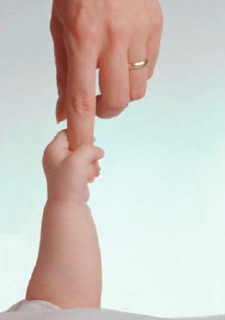Introduction
Breastfeeding is a special gift of love and health only you can give your baby. The special bonding ties you and your baby together physically and emotionally.
Human milk makes a world of difference - not only is it the best food for your baby - it’s your baby’s first immunization, preventing illness. Talk with your friends or relatives who were successful in breastfeeding. You also can talk with a lactation specialist. Ask your hospital, doctor or clinic for a list of lactation specialists.
Most women need support and education during pregnancy to prepare them for breastfeeding. So be sure to tell whoever is going to the hospital with you that you plan to breastfeed.
The American Academy of Pediatrics urges mothers to begin breastfeeding within the first hours after the baby’s birth, and continue to breastfeed to support the growth and promote the health of your baby.

“Breast is Best!”
- It takes about 500-600 more calories per day to produce breast milk. This may help mom return to her pregnancy weight sooner - especially if she is physically active.
- Mom also can return to her previous shape faster as breastfeeding causes her uterus to contract after birth.
- Breast milk is always warm, fresh and readily available. There is no shopping, preparation and washing of bottles. Mother’s milk is naturally “sanitized”.
- The special bonding created by breastfeeding helps mother feel good about herself and brings out the best of motherhood.
- Breastfeeding makes mom’s life easier - breastfed babies don’t get sick as often. It is much easier to care for healthy babies.
- The latest research indicates that breastfeeding might protect women from getting breast cancer later in life. The longer the breastfeeding, the greater the protection.
“Benefits for Baby!”
- Breast milk is nature’s plan to nourish the baby - it is made exclusively for babies.
- The unique balance of nutrients and other components makes human milk superior to formula.
- Breast milk contains growth factors and other protective substances that guard against illnesses, such as diarrhea, meningitis, diabetes, respiratory and ear infections. Also, certain cancers (acute leukemia and lymphomas) occur less frequently among breastfed children.
- The first milk, called “colostrum” is baby’s first defense in fighting colds and infections. It also acts as a laxative and clears the baby’s intestines of meconium (the black, tarry stool).
- Breast milk is easily digested. Babies have less gas, constipation and diarrhea.
- No additional formula, water or other foods are necessary during the first four to six months of breastfeeding.
- Some researchers note that breastfed babies may grow up to be less fat; others found that breasted babies perform better in school, especially if they were born smaller than normal.
- Breastfeeding helps babies develop jaw muscles - this helps tooth alignment.
“You Can Breastfeed!”
Breastfeeding is natural, but it takes practice. You must be patient as it usually takes several days for you and your baby to learn how to breastfeed comfortably. Even if you cannot continue for six months or a year, any length of time breastfeeding - 1 month, 2 months, or 3 months - is the best choice for mom and baby.
Frequently Asked Questions
Can I get pregnant while I am nursing?
Although it appears to be harder to get pregnant while you are breastfeeding, it is not a sound method for birth control. Make sure you talk with your health care provider before starting any birth control methods as some types interfere with breastfeeding.
Will my breast sag?
No. Sagging breasts are not due to breastfeeding. If you have large breasts, they will sag due to gravity, whether you breastfeed or not
References
Mom's Special Gift is funded by the Food Stamp Program. Food Stamps can help make ends meet and serve as the first line in defense against hunger. It enables low income families to buy eligible nutritious food in authorized food stores. For information about the Food Stamp Program in Nevada, call: 1-800-992-0900, ext. 0500.
Tang, M. and Sigman-Grant, M.
2003,
Mom’s Special Gift,
Extension | University of Nevada, Reno, FS-03-15


